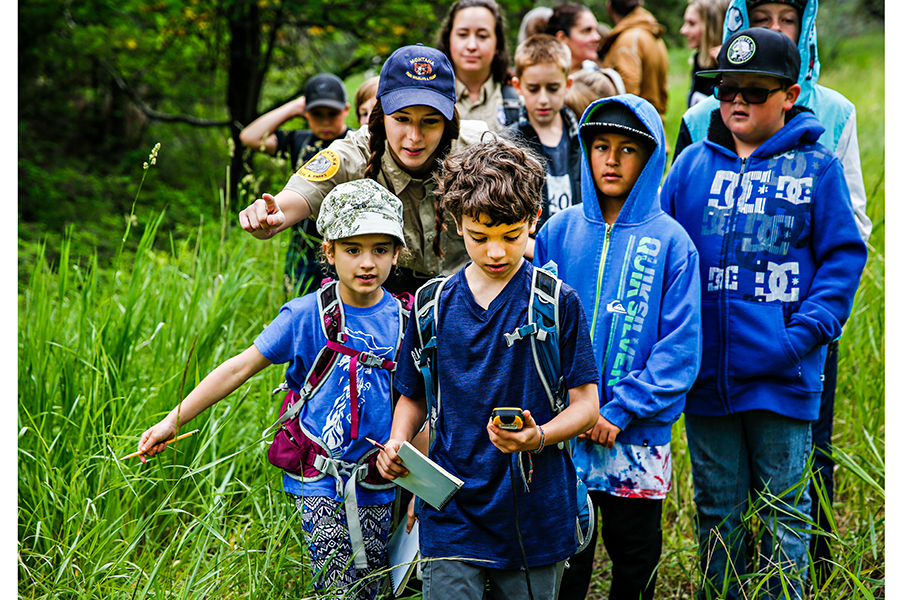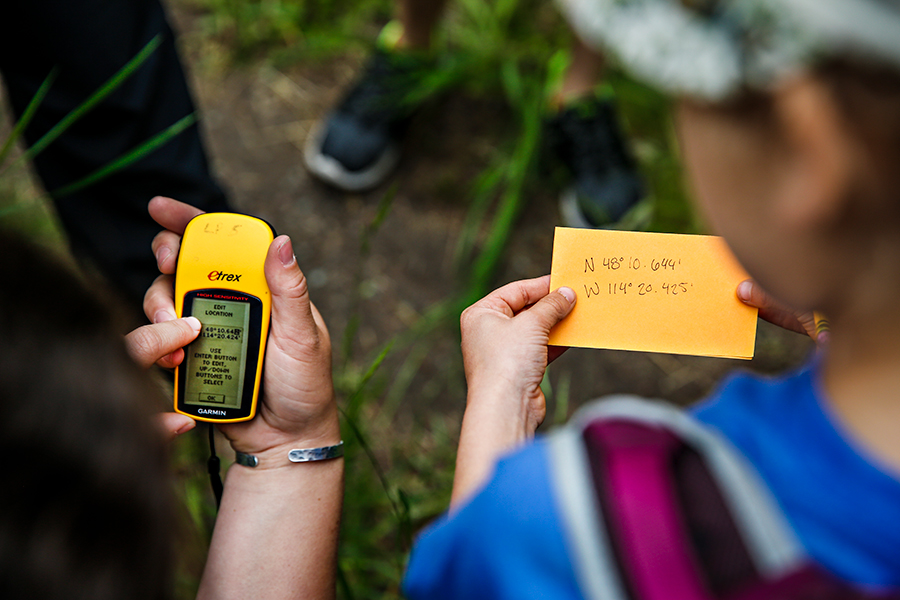Outdoors Issue 2019: AmeriCorps Members Help Montana State Parks Educate the Public
State parks such as Lone Pine offer programs and activities for all ages
By Charlotte Bausch
Kyle Gallaher helps a sixth-grader adjust the dial on a GPS until the number on its screen matches those on the hot-pink flashcard in her hand.
“You’ll be our navigator,” she tells him, and the group of third- to sixth-graders files out the classroom door and into the woods, searching for the first of the geocaches Gallaher hid along the trail earlier in the morning.
They have gathered at the visitor center of Lone Pine State Park for Junior Ranger Days, an educational program that runs throughout the summer and teaches kids a range of outdoor topics and skills. This morning, the topic is geocaching.
Junior Ranger Days is one of a variety of children’s activities Gallaher has led at Lone Pine since coming to the park as an AmeriCorps member earlier this year.
Like many members, Gallaher joined AmeriCorps shortly after graduating from college, and is using her time at the parks to learn skills necessary for her future career.
“I was graduating college with a degree in business and psychology,” she said. “And then decided that I wanted to be a park ranger.”
Although AmeriCorps is often associated with inner-city poverty projects, it has a huge variety of programs across the country, including those in state parks. AmeriCorps was founded in 1993 as the domestic version of the Peace Corps. Its members do a wide range of tasks to help organizations with limited budgets and staff. AmeriCorps members have been working in Montana State Parks since 2012.
Members like Gallaher oversee a large part of the educational programming in Montana’s state parks and provide much-needed support to park rangers, who are often responsible for several parks at once. According to Derrick Raithe, the ranger at Lone Pine State Park and two others in the area, the assistance of AmeriCorps members allows the parks to offer more services and educational programs, while rangers focus on essential maintenance tasks.
“With them we’re able to do a lot more than what we’d be able to if we didn’t have any sort of help,” Raithe said. “They [AmeriCorps] partner with state parks in a way that they can add a service to our parks that was missing before.”
There are two AmeriCorps members currently at Lone Pine, Gallaher and Juliana Himmel, who came to Lone Pine in June after working at Flathead Lake state parks last year. Together, they manage most of the educational programs. Himmel oversees most of those directed to the general public, while Gallaher handles children’s activities.

Himmel and Gallaher, along with Raithe and a patchwork of volunteers, offer a variety of educational events at the parks. Kids’ programs are available for kindergartners to middle-schoolers, with field trips, Junior Ranger Days and Flathead Valley Junior Astronomers’ Club. Offerings for all ages include hikes with educational themes (a recent hike, titled “Can I eat this?,” taught guests about edible flowers and shrubs), guest talks with experts and events that focus on wildlife.
AmeriCorps members often come up with educational programs to implement. This summer, Himmel will be hosting a new series of table talks in which she sets up tables of interesting nature objects in the park and gives short talks about them for interested passersby.
The educational programs at the state parks are meant to be affordable and accessible to all community members. They give people the opportunity to learn about and experience the parks with the benefit of a knowledgeable guide.
Junior Ranger Days, and the children’s educational programs in general, are about “getting kids out in the park and connecting with everything around them,” said Gallaher.
At this Junior Ranger Day, kids are connected with both the land and GPS. They fly up the side of the hill, yelling the distance from the geocache as they go.
“20.1 feet!” a boy yells. He doubles back as the numbers get larger. Gallaher watches, expertly redirecting and joking around with the kids.
Finally, a boy pulls the plastic bag with the geocache from its hiding place and waves it in the air, triumphant. Everyone troops back to the visitor center for lunch. Later, Gallaher will show the kids a destroyed campsite and teach them how to be responsible campers on parkland.
“This is their land,” Gallaher said. “The more they can be involved with it and understand it and want to be a part of it, the better.”